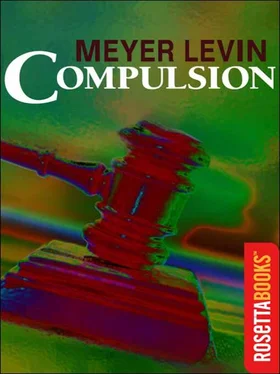Charles Kessler had mastered himself so well that one could not have recognized, offhand, that he was the father of the slain boy. All his energy was available; grief had not drained him. Throughout the case this impressed me. It was not that I felt he lacked emotion; it was simply that his remarkable control seemed in some obscure way linked to a pattern that lay beneath the entire crime, a pattern of feelings pushed down so that nothing could show.
“I am racking my brain,” the father kept saying to Nolan. “It had to be someone who knew Paulie, or Paulie would never have gone with him. Paulie was not a boy to go with a stranger. If they tried to take him in a car he would have put up a struggle. It had to be someone he knew.”
Tom motioned me to be on my way.
I walked down the block where Paulie had walked perhaps at this same hour just the day before. The body I had seen on that zinc table had walked under these trees, past these hedges, past these fine brick walls, and somewhere along here he had been snatched from life.
I pictured the kid, idling home from his after-school ball game. A man approaches – but it must have been in a car. A boy of thirteen doesn’t respond to an offer of candy. An ice-cream soda, maybe – an offer from a teacher, driving home?
And once in the car? Perhaps a suggestion to go to the teacher’s house? No, that would risk being seen. Just to take a ride, then. Out through the park, and toward Hegewisch.
Somewhere, the perversion had taken place. I tried to imagine in my own body the impulse to do such a thing. I suppose this is a test that everyone makes. I tried to call up in myself such a sick lust, and to watch my own reaction. Could I comprehend such a perverted impulse? Only kid things in back alleys came to me. In today’s popularized Freudian knowledge, I suppose I should say that I stopped myself from homosexual imaginings because of some fear. But at that time, walking on Ellis Avenue, I felt, rather sanctimoniously, that it wasn’t in me.
As I turned the corner, there was the Mark Twain Academy, a square brick structure annexed to a former mansion. And there was the baseball lot where Paulie had played. The lot was deserted.
Indeed, the street was deserted. This was ordinarily an hour when children loitered outdoors, but though the murder itself was not yet known, the disappearance of Paulie had by now filled the exclusive neighbourhood with rumours. The moment school was over, mothers had appeared in cabs, or chauffeurs had appeared, or governesses had come to walk the children home.
And then the quiet was broken by a newsboy shouting, “Extra!” He came at a half run, a large boy, and he kept on yelling while I was buying my paper. “Extra, all about the kidnapping, murder!” I gulped the banner, MILLIONAIRE BOY SLAIN. And in large type the lead read, “Identified by a Daily Globe reporter today as Paulie Kessler, son of-”
I wanted to tell that newsboy it was I – I, the Daily Globe reporter. But he rushed on.
I read Tom Daly’s story, Tom’s and mine, then folded the paper and approached the school. If the fiend who signed himself “Harold Williams” was indeed one of the teachers, he would have been careful to attend to all his normal duties today, slipping out only to make the ransom phone call mentioned in Tom’s story.
There was still a small group of teachers in the entrance hallway, discussing what was to them, until that moment, only the mysterious disappearance of Paulie Kessler. They didn’t look like the teachers I had had as a kid. More of them were men than in a public school, and these wore tweedy jackets and pullovers.
“Reporters, already?” said one of the young lady teachers, with an air half annoyed, half intrigued, as I introduced myself. “Really, we don’t know a thing. We’ve no idea where he can be.”
“He’s been found. He’s dead,” I said dramatically, and handed them the paper. I was watching their reactions, looking them over with the question in my mind, Is this one a pervert? A murderer?
When the exclamations had died down, I asked if any of them had had Paulie in class, and two men spoke up. The tall, athletic young man in the belted sports jacket had taught Paulie American history. He had that inordinately clean, scrubbed look that certain people achieve; I half imagined a British accent when he spoke. Could this be a degenerate?
Today, an intonation, a movement of a hand in a night club is enough to bring a laughing roar of recognition. But I looked for I don’t know what – some indication of nervousness, I suppose.
No teacher had been absent from school that day, they told me, the first young woman taking the lead in answering, a slight asperity in her tone. As for Paulie, the usual things were said, several joining in. He was alert, a likable boy. Not at the head of his class, but a real boy, intelligent and quite popular.
Paulie’s other teacher now dropped a remark of the kind newspapermen seize upon for feature touches. Why, only day before yesterday, Paulie had won a debate on capital punishment. Paulie had been on the negative side.
This teacher’s name was Steger. He had soft, red cheeks, and he spoke in a somewhat breathless voice. He went on talking, it seemed to me almost defensively, mentioning how he had noticed the kids after school yesterday at their ball game as he was going home.
Indeed, several of the teachers seemed to be dropping alibis into their remarks, telling, as though accidentally, what they had done last night, whom they had been with. And they seemed to be breaking away from one another, under the uneasy, spreading suspicion. How could anyone know what was inside the mind and heart of his nearest colleague? Beneath all human communication there was a dark ocean, lava-like – the real human action lay there, the force we could not measure, nor check, nor even detect from the surface.
Steger mentioned a book he had been reading last night, talking so insistently that it seemed, when the police car pulled up, that he had by some compulsion drawn the whole thing upon himself. We all saw the car halting directly in front of the door. A silence fell. Two of the plain-clothes men I had seen at the Kessler house now entered the school.
The sprightly young woman spoke to them. “But, officers, police were here this morning. We’ve all been questioned, we’ve told all we know.”
One of the detectives looked at his notebook. “There a teacher named Wakeman here?” Wakeman had gone home. The detective went on, “Anybody named Steger?”
“That’s me,” said Steger softly. “Paulie was in my English class. But I’ve already-”
“We’ve got instructions to take you along, Mr. Steger.”
There was a gasp again, in the group, and a half gesture from one or two of them, as to intervene, to explain. And then the falling back, the not looking at Steger.
What Steger would have to go through, in the coming weeks, I suppose can be called an inevitable by-product.
The teachers were suddenly quiet. I started back to the Kessler house.
Leaving Artie waiting in the Stutz, which they had picked up on their way downtown, Judd drove the rented Willys into the garage of the Driv-Ur-Self. He got out of the car and stood leaning against its door while the manager walked around the vehicle, glancing at the fenders.
Judd looked away from the car; he would not let himself think of the spots on the rear floorboard. The manager would never inspect the rear. If he did, Judd was prepared to make the remark about the spilled wine, to hint about laying a broad back there – boys will be boys, what’s a car for, ha ha.
But the nausea invaded him again. It pulsed up in him like a pulsing flow of blood. Blood on the ground, blood when his fingers touched his forehead, and he was shrieking… wrestling on the lawn with his big brother Max, his forehead cut on a stone, and Max at first concerned and then getting sore… “Stop crying. Stop bawling. That’s enough! Boys don’t cry. What the hell are you, a girl? A girl?” And his own shrieking – “I’m not a girl! I’m not a girl” – while Max taunted, Max laughed… Max laughing at him, Max making fun of him, his big brother Max, he couldn’t stand it; it was worse than the pain, the bleeding. Then he had known he had to hide everything inside himself, hide from Max. Keep Max outside himself, keep everybody outside himself – they could hurt too much. A man didn’t let anything hurt. And he was no girl. He was no girl to cry at blood. And his mother had come out of the house and folded his face in her skirts. A girl. A girl.
Читать дальше












